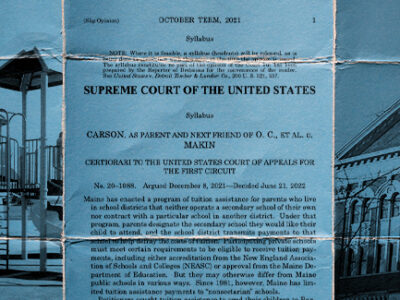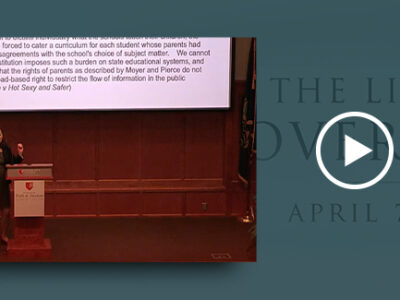You love your house, you love your neighborhood, and you are pleased that local officials want to help toward its development. Yet, after the Supreme Court recently declined to rehear the Kelo vs New London, CT decision, economic development in your area, rather than a benefit, might make you have to look for another house. It seems that “every man’s house is his castle” unless someone convinces the court that they need your property for their development.
Few things are more precious and essential to the free society as the rule of law. The principle of equality before the law under limited government is respected in very few countries, and ours is one of the best. Even in Europe, the rule of law has been weakened by confusing it with the rule of regulations and the rule by the state.
In no other country does the election of a Supreme Court judge elicit so much attention and mobilize so many resources. Decisions by the Supreme Court are regarded by many as the final word. That is why those who cherish the free society are so concerned by the Kelo vs. New London decision. The ruling, favored the efforts of a private entity, The New London Development Corporation, to force homeowners to sell their houses. Pfizer, another private company, has been mentioned, even by some of the justices, as benefiting from the ruling.
In the sixteenth century, in one of the earliest texts written on economics, Bartolomé de Albornóz has a wonderful story that came to my mind when reading the 5-4 Supreme Court decision. Albornóz writes “It is a general rule that the public good must be placed before the private good, but it is difficult to know what the public good is… I ask the reader to read [in Portuguese history] about the extremely sumptuous palace constructed by a pagan king. On its grounds was the hut of an old lady who had refused to sell it to the king. He showed this building to everyone so they could see how just a king he was and how much freedom his subjects enjoyed.”
Private property is essential to the principle of limited government, without it the rule of law becomes the rule of the strongest. The Institute for Justice (IJ), who defended the homeowners, correctly cautioned that when private entities wield government’s power of eminent domain and can justify taking property with the nebulous claim of “economic development,” all property owners are in trouble.
Other governments, or a similar court in a different case, might use the same reasoning to limit or harm Pfizer’s activities. As some people are being obliged to sell their houses, foreign courts might oblige Pfizer or other manufacturer to sell their drugs or their licenses to a competitor. After all, traditionally, intellectual property rights have had less protection than material property.
I have little doubt that in the global scene, Pfizer, a major multinational, will receive more damage than benefits as a result of the Supreme Court decision. These decisions are read and studied by lobbyists and jurists all over the world. It is understandable therefore that the company has been trying to distance itself from the case.
They call attention to the fact that they built their Global Research and Development Headquarters in New London in 2001 and the eminent domain ruling played no role. The appeal by homeowners from a nearby neighborhood objected to the use of eminent domain by the City as part of its redevelopment plan. Pfizer stayed out of the litigation and stated that it had no stake in the outcome of the case and has neither “requirements nor interest in the development of the land that is the subject of the case” and will not acquire any property there.
The benefits that can flow into New London, from the jobs to the taxes and the philanthropic contributions should not play a part in deciding if the government can force someone to sell them their property. The great gift of Pfizer to the world are not those benefits but the millions of lives saved and improved by their drugs as well as their outstanding record on corporate governance.
Another great blessing of the United States is the spirit of personal initiative that exists in most areas, and public policy is one of them. No other country has such a diverse and vibrant independent think tank and advocacy group culture. Some of them, like IJ, will never give up promoting their vision of the free society. To prevent similar abuses on private property, which multiplied after the Kelo decision, they created “castlecoalition.org.” Those who missed an opportunity to side with the homeowners, including Pfizer, have now a wonderful opportunity to channel resources to a coalition that is fighting to protect even these tiny castles which we call home.




